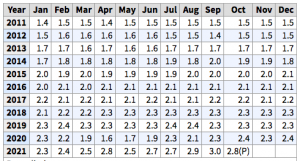The headlines are full of the great resignation or the idea that in the post covid environment, tens of millions of people are quitting their jobs. Since I am increasingly skeptical about everything I read in the media, I thought I would look into the numbers and try and piece together what is really true.
Most of the articles I have seen show astonishing numbers such as 4 million people have quit their jobs in a given month in the United States. According to the Bureau of Labor Statistics, the actual number for April 2019 was 3,992,000 and this is certainly alarming. The thing is that this is actually only 2.8% of the 143 million people working in the United States so the first thing we need to do is to put such numbers in perspective.
Even so, if you add up April, May, and June, you get 11.5 million people leaving their jobs, and the 12 month total from November 2020 through October 2021 is over 45 million!. This data comes from a database called JOLT that the Bureau keeps up to date through a regular survey. The number that I and most reports are drawing on is called the “quit rate”. You can read more about the database here.

To get a better idea of what is actually going on, I thought it would make sense to compare the last year with another year before the pandemic to see if it’s normal for millions of people to quit their jobs. The number for the period of November 2017 through October 2018, for example, was 40 million. The difference between the last year and a few years ago is about 5 million more people have left their jobs in the last year than normally do so.
What this analysis tells me is that the great resignation does appear to be a real phenomenon although the numbers are far lower than what you might see in some of the press reports and on social media.
In looking through the different articles and reports the reasons for the mass resignation include:
- People being burned out by zoom meetings and working from home
- Others and especially front line personnel like nurses and check out people concerned about their own health
- People who feel that their wages and benefits are simply too low or limited to justify the time spent at work
At the more granular level, the quit rates in health care, retail, and foodservice are all up by a full percentage point or more compared to a couple of years ago and these are some of the lowest-paid and highest risk sectors of the economy.

In his opinion piece on the subject in the New York Times, Paul Krugman rejects the idea that the resignation has to do with emergency unemployment benefits but does lend his support to the ideas of Arindrajit Dube, from the University of Massachusetts at Amherst who thinks it is due to people realizing that they were working in low paying jobs they didn’t like any
One thing I have heard from many people from all over the world is that the pandemic has helped them remember what is most important in life such as health and family. Maybe the explanation is that 5 million people, about 3.5% of the American workforce realized in 2020 that their current work was taking them away from that without providing enough of a sense of purpose or economic compensation to make that sacrifice worthwhile.


I also wonder if people are leaving jobs because they no longer have the same kind of relationship with their manager or colleagues? If I no longer have a healthy bond with my boss or my colleagues because work is now virtual, the “glue” begins to fail. Which leads to a few questions: Where will we find that work connection next? How might companies change the “employee value proposition” to keep and attract talent? If there is opportunity in every crisis, what is the opportunity here?
Interesting would also be a comparison between all the countries, as this might also be a cultural thing. But with the different restrictions / obligations in all the different countries, it might not be that easy to sum up and give a conclusion.